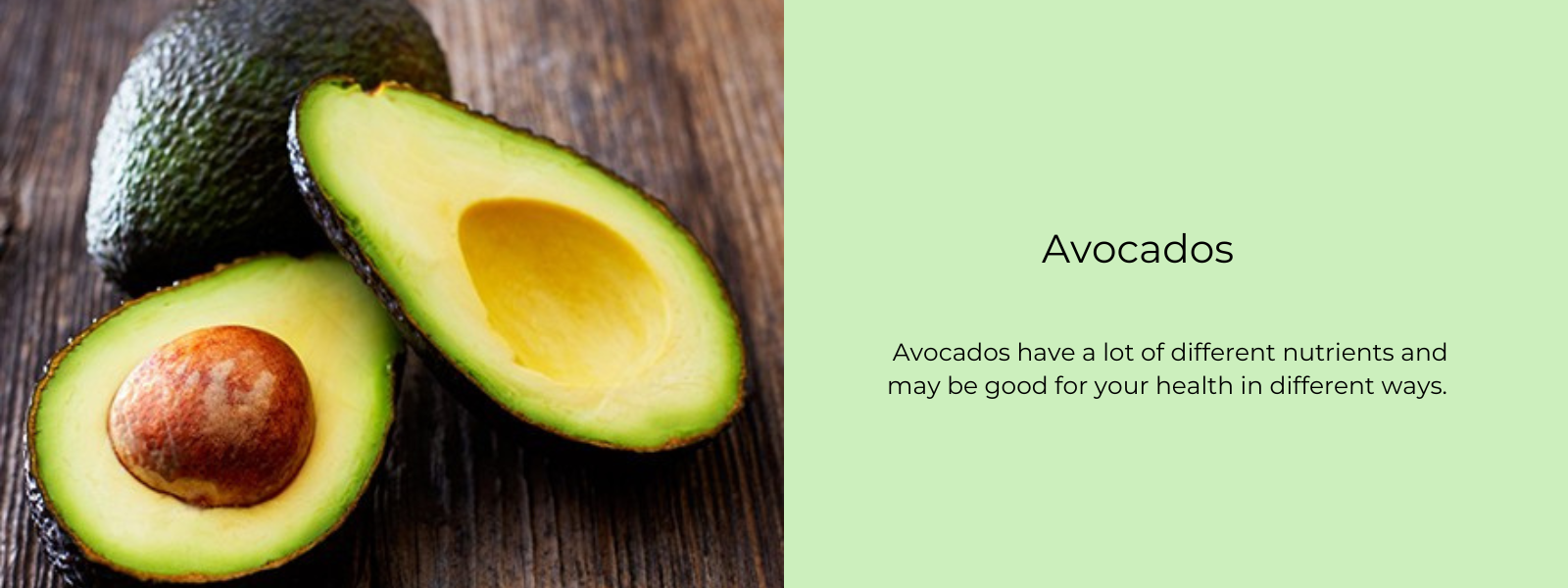Avocado is not only delicious but also packed with nutrients, making it a versatile and nutritious addition to any diet. Rich in healthy monounsaturated fats, avocados offer numerous health benefits. They are an excellent source of potassium, which helps regulate blood pressure and maintain heart health. Avocados also contain fiber, which supports digestive health, promotes satiety, and helps regulate blood sugar levels. Additionally, avocados are loaded with vitamins and antioxidants, including vitamin E, vitamin C, and carotenoids, which help protect cells from damage and support immune function. Incorporating avocados into meals can enhance their taste, texture, and nutritional value, whether mashed into guacamole, sliced onto toast or salads, or blended into smoothies. With its nutrient-rich profile and delicious flavor, avocado is truly deserving of its reputation as a beloved superfood.
Table of Contents
What Is Avocado?
Avocado is a fruit that originates from Central America but is now cultivated and enjoyed worldwide. Botanically, it belongs to the Lauraceae family, which also includes bay laurel and cinnamon. Avocados are prized for their creamy texture, mild flavor, and versatility in culinary applications. The fruit has a green, leathery skin that encases a buttery, pale-yellow to greenish flesh surrounding a large central seed or pit. Avocados are rich in healthy monounsaturated fats, fiber, vitamins, and minerals, making them a nutritious addition to various dishes. They are commonly used in salads, sandwiches, dips (such as guacamole), smoothies, and as a topping for toast or eggs. Avocado is also increasingly used as a substitute for butter or mayonnaise in recipes, owing to its creamy texture and healthy fat content.
Does Avocado Have Healthy Fat?
Yes, avocados are rich in healthy monounsaturated fats, which are beneficial for heart health and overall well-being. The predominant type of fat found in avocados is oleic acid, a monounsaturated fatty acid that is known for its potential to reduce inflammation and improve cholesterol levels. Monounsaturated fats have been associated with various health benefits, including reduced risk of heart disease, improved insulin sensitivity, and better weight management.
Benefits Of Healthy Fat:
Healthy fats play a crucial role in supporting overall health and well-being. Some of the key benefits of consuming healthy fats include:
- Heart Health: Healthy fats, particularly monounsaturated and polyunsaturated fats, can help improve cholesterol levels by increasing HDL cholesterol (the "good" cholesterol) and reducing LDL cholesterol (the "bad" cholesterol). They also help lower triglyceride levels, reduce inflammation, and support overall heart health, lowering the risk of heart disease and stroke.
- Brain Function: The brain is composed of approximately 60% fat, and consuming healthy fats is essential for maintaining optimal brain function. Omega-3 fatty acids, in particular, are crucial for brain health, supporting cognitive function, memory, and mood regulation. Adequate intake of healthy fats during pregnancy and infancy is also essential for fetal brain development.
- Weight Management: Despite being calorie-dense, healthy fats can aid in weight management by promoting satiety and reducing hunger cravings. Including healthy fats in meals can help stabilize blood sugar levels, prevent overeating, and promote a feeling of fullness, leading to better appetite control and weight maintenance.
- Nutrient Absorption: Certain vitamins, such as vitamins A, D, E, and K, are fat-soluble, meaning they require fat for absorption and utilization by the body. Consuming healthy fats with meals enhances the absorption of these essential vitamins, ensuring optimal nutrient uptake and utilization.
- Skin Health: Healthy fats play a role in maintaining skin barrier function, hydration, and elasticity. Omega-3 fatty acids, in particular, help reduce inflammation, protect against sun damage, and promote healthy skin cell turnover, leading to improved skin texture, moisture, and overall appearance.
- Hormone Regulation: Fats are essential for hormone production and balance in the body. Healthy fats provide the building blocks for steroid hormones such as estrogen, progesterone, and testosterone, which regulate various physiological processes, including metabolism, reproduction, and stress response.
- Inflammation Reduction: Certain types of healthy fats, such as omega-3 fatty acids found in fatty fish, flaxseeds, and walnuts, possess anti-inflammatory properties. Consuming these fats can help reduce chronic inflammation in the body, lowering the risk of inflammatory diseases such as arthritis, diabetes, and cardiovascular disease.
- Cell Structure and Function: Fats are integral components of cell membranes and play a vital role in maintaining cell structure, integrity, and function. Healthy fats provide the necessary building blocks for cell membranes, ensuring proper cellular communication, signaling, and nutrient transport.
Nutrient-Rich Benefits of Avocados:
Avocados are prized for their nutrient-rich composition, containing a variety of vitamins, minerals, healthy fats, and antioxidants. Some of the key nutrients found in avocados include:
- Healthy Fats: Avocados are rich in monounsaturated fats, particularly oleic acid, which is beneficial for heart health and may help lower LDL cholesterol levels.
- Dietary Fiber: Avocados are an excellent source of dietary fiber, which promotes digestive health, supports regular bowel movements, and helps control appetite and blood sugar levels.
- Vitamins: Avocados are packed with vitamins, including:
- Vitamin K: Essential for blood clotting and bone health.
- Vitamin E: A powerful antioxidant that protects cells from damage and supports skin health.
- Vitamin C: Important for immune function, collagen production, and antioxidant activity.
- Vitamin B6: Plays a role in energy metabolism, brain health, and immune function.
- Minerals: Avocados provide various minerals, such as:
- Potassium: Important for regulating blood pressure, fluid balance, and heart function.
- Magnesium: Necessary for muscle and nerve function, bone health, and energy metabolism.
- Copper: Supports energy production, antioxidant defense, and iron metabolism.
- Antioxidants: Avocados contain antioxidants such as lutein, zeaxanthin, and tocopherols, which help protect cells from oxidative damage, reduce inflammation, and support eye and skin health.
- Phytonutrients: Avocados are rich in phytonutrients like polyphenols and flavonoids, which have anti-inflammatory and antioxidant properties and may help reduce the risk of chronic diseases.
- Protein: While avocados are not high in protein compared to other plant-based foods, they do contain small amounts of this macronutrient, contributing to overall nutrient intake.
Best Ways To Reap The Benefits Of Avocados:
To reap the nutrient-rich benefits of avocados, consider incorporating them into your diet in various ways. Here are some of the best ways to enjoy avocados and maximize their nutritional value:
- Avocado Toast: Spread mashed avocado on whole-grain toast and top with a sprinkle of salt, pepper, and optional toppings such as sliced tomatoes, red pepper flakes, or a drizzle of balsamic glaze.
- Guacamole: Prepare homemade guacamole by mashing ripe avocados with lime juice, minced garlic, diced tomatoes, chopped cilantro, and salt. Serve with whole-grain tortilla chips or raw vegetable sticks for a nutritious snack or appetizer.
- Salads: Add sliced or diced avocado to salads for a creamy texture and boost of healthy fats. Avocado pairs well with mixed greens, tomatoes, cucumbers, bell peppers, red onion, and a light vinaigrette dressing.
- Smoothies: Incorporate ripe avocado into smoothies for added creaminess and nutritional benefits. Combine avocado with leafy greens, fruits such as banana or berries, Greek yogurt, and almond milk for a nutritious and satisfying drink.
- Sandwiches and Wraps: Use sliced avocado as a creamy spread in sandwiches and wraps instead of mayonnaise or cheese. Pair avocado with lean protein, vegetables, and whole-grain bread or tortillas for a balanced and filling meal.
- Sushi Rolls: Make homemade sushi rolls with avocado, cucumber, and other favorite fillings for a nutrient-rich and satisfying meal. Avocado adds creaminess and texture to sushi rolls while providing essential vitamins and minerals.
- Eggs: Top scrambled eggs, omelets, or poached eggs with sliced avocado for a nutritious and delicious breakfast or brunch option. Avocado adds richness and flavor to eggs while boosting their nutritional value.
- Salmon Stuffed Avocado: Fill halved avocados with flaked salmon, Greek yogurt or cottage cheese, diced vegetables, and herbs for a nutrient-dense and satisfying meal. This dish is rich in omega-3 fatty acids, protein, and vitamins.











Leave a comment